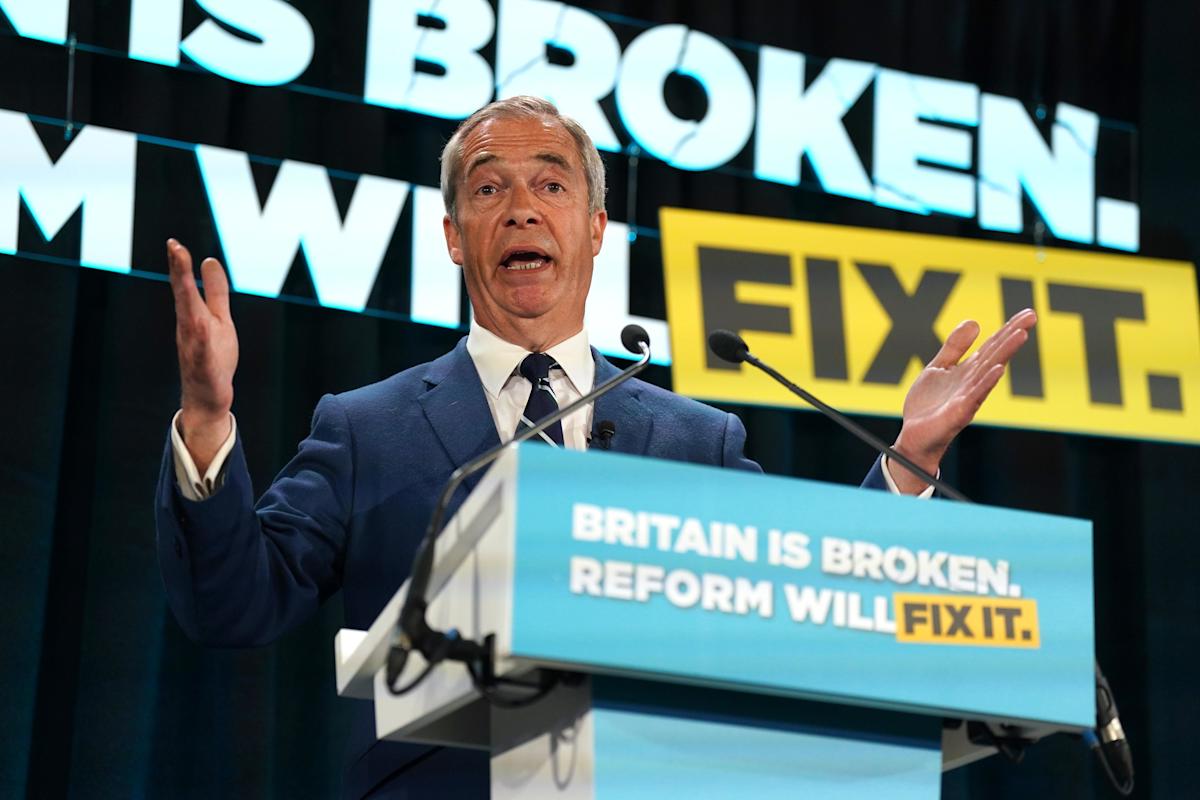“We’re here, and we’re here to stay,” Reform UK leader Nigel Farage told a crowd in County Durham during a campaign speech on Tuesday.
With his party standing more candidates in the upcoming local elections on 1 May than either Labour or the Conservative Party, Farage lauded recent polling for Reform as “astonishing progress”.
“Our support is coming directly from people who have been, in many cases, life-long Labour voters,” he said, claiming his right-wing anti-immigration party is now “the opposition to the Labour Party”.
Farage said Reform had made gains in council by-elections in recent weeks, including in the Longdendale ward in Tameside and the Blackbrook ward in St Helens.
“It is going to be, I think, incredibly close in Runcorn. So in the Midlands, in the North, in Wales and in Scotland, Reform is now the opposition to the Labour Party, with the Conservatives trailing some way behind,” he said.
“The sheer level of betrayal of what people who voted for Boris Johnson in 2019 got, they didn’t get the Brexit they voted for… those people are not ever going to trust the Conservative Party again.”
With Farage striking such an optimistic tone at Tuesday’s speech, how well is the party really expected to do in next month’s elections?
What do the polls say?
At his speech in County Durham, Farage claimed Reform was “parking their tanks on the lawns of the red wall”, referring to the historic heartlands of Labour in the Midlands and North of England.
This claim is supported by a new poll, carried out by Survation for the Sun, which has shown that since the general election in July 2024, Reform UK’s popularity in the North and Midlands has risen from 18% to 30%.
Meanwhile Labour’s vote share in these regions has dropped from 39% to 27%, while the Tories have suffered a smaller fall from 24% to 22%.
Survation said that among likely voters in this year’s local elections across the region, Reform currently is expected to hold 29% of the vote share, compared to 24% for the Conservatives, and 20% for Labour.
The polling suggests that Reform is securing its status as the main threat to Labour.
When asked to name the party most likely to threaten Labour in this year’s local elections, 44% of respondents chose Reform – well ahead of the Conservatives (26%) and Liberal Democrats (8%).
A local election poll carried out by Electoral Calculus puts Reform on equal footing with the Conservatives, with 25% of the vote.
The poll was put together using Multi-level Regression and Post-stratification (MRP), a relatively recent technique that has successfully predicted the last three general elections, and gives the estimated result in each local authority.
It suggests Labour is only on 18%, just ahead of the Liberal Democrats at 17%.
How is Reform UK polling nationally?
Recent projections by J.L. Partners suggest that Reform UK and the Conservatives would be “neck-and-neck” if a general election was to be held now.
The market research company’s POLARIS model, which uses data from council by-elections to predict election outcomes mid-cycle, suggests Labour would lose its majority in the House of Commons.
It puts Keir Starmer’s party at 218 seats, the Tories at 136 and Reform biting at their heels with 135 seats in Parliament.
Meanwhile YouGov’s voting intention poll, released today, suggests 23% of voters would choose Reform now, compared to 24% for the Tories and Labour.
What about benefits?
Despite the upbeat and hopeful messaging of Labour as it entered office nearly a year ago, the party has taken plenty of opportunities to upset the British electorate, including over its proposed welfare cuts.
Data compiled by the Disability Poverty Campaign Group suggests at least 80 Labour MPs are at risk of losing their majorities over the planned reforms.
This, the group suggests, is because these MPs have a majority in their constituencies that is smaller than the number of disabled people who face having their benefits slashed.
Some particularly at risk constituencies for Labour include Ribble Valley in Lancashire, Derbyshire Dales, South West Norfolk, Middlesborough South and East Cleveland, and Lichfield.
Responding to the findings, former shadow employment minister Andy McDonald told the Guardian: “The government’s welfare reforms disproportionately hit constituents who can least afford it and that is particularly so in the constituencies of many Labour MPs. It poses a real electoral risk.”
Polling by More in Common and the Joseph Rowntree Foundation also found that 58% of people think cuts to disability benefits are a bad idea, with “particularly strong” objections among key parts of Labour’s voter base, such as “progressive activists”, “civic pragmatists” and “loyal nationalists”.
New polling with @Moreincommon_ finds 58% of people think the cuts to disability benefits are a bad idea.
Objections are particularly strong in some key parts of Labour’s voter coalition (see progressive activists, civic pragmatists & loyal nationals below) pic.twitter.com/yG2qZMj4pl
— Katie Schmuecker (@KatieSchmuecker) April 2, 2025
However despite this pattern, Tom Lubbock, founding director of J.L. Partners, told Yahoo News that he has not seen any indication that benefit reforms are driving voters away from Labour in significant numbers.
However, he suggested a number of other factors are pushing Labour supporters into Reform’s hands – mainly a lack of enthusiasm over how Starmer’s government has been doing so far.
Why are Reform UK doing well?
Lubbock said that Reform UK had a “post Christmas bloat” but have “really plateaued” in the last two months and have “stopped making progress”.
“It’s a combination of what’s happened since the general election… Labour essentially took our a playbook which said ‘let’s make ourselves as unpopular as we can in 12 months,” he said.
He cited “talking down of the economy”, constraints on the budget, the review of agricultural property relief (APR) for farmers and a general sense that “nothing was getting any better” as the cost of living remained high.
“Labour have found their floor for the time being,” he added, which is also benefiting Farage’s party, adding that a broadly similar number of Conservative and Labour supporters have gravitated towards Reform.
“Most of it is a messaging or comms issue, I don’t think anyone expected the NHS to immediately improve, there has just not really been any positive change, or it has been very, very slow.”
Meanwhile, Lubbock said, many voters concerned about illegal immigration feel that having criticised Rishi Sunak for “over-promising and under-delivering”, Labour has done the same when it comes to stopping people smuggling gangs and illegal migration.
YouGov polling from January suggests 18% of people who would consider voting for Reform would do so because of its policies on immigration – the biggest single reason other than “another party needs to go/better than the rest”.
Polling by YouGov from March said the “negativity about the economy is highest among those who voted for right-wing parties”. YouGov also found that only 14% of voters thought Chancellor Rachel Reeves was doing a good job.
Like him or loathe him, Farage has a strong presence, and while Lubbock said he can certainly claim a lot of credit for Reform’s successes, there are wider issues at play here.
“You can see how far Reform got without him, which is not nowhere but any about halfway to where they are now,” he said, adding that the party has “advanced further” since Farage expressed his intention to lead the party.
He said that while Reform’s leader is certainly a “valuable asset”, voter intention is not a “poll of Nigel Farage” and that there is a wider pattern of “rebellion” against the two parties who have dominated British elections for countless decades.
“Don’t underestimate the protest vote in British politics,” he added, “it is extremely strong both in general elections and local elections.”
Read more


